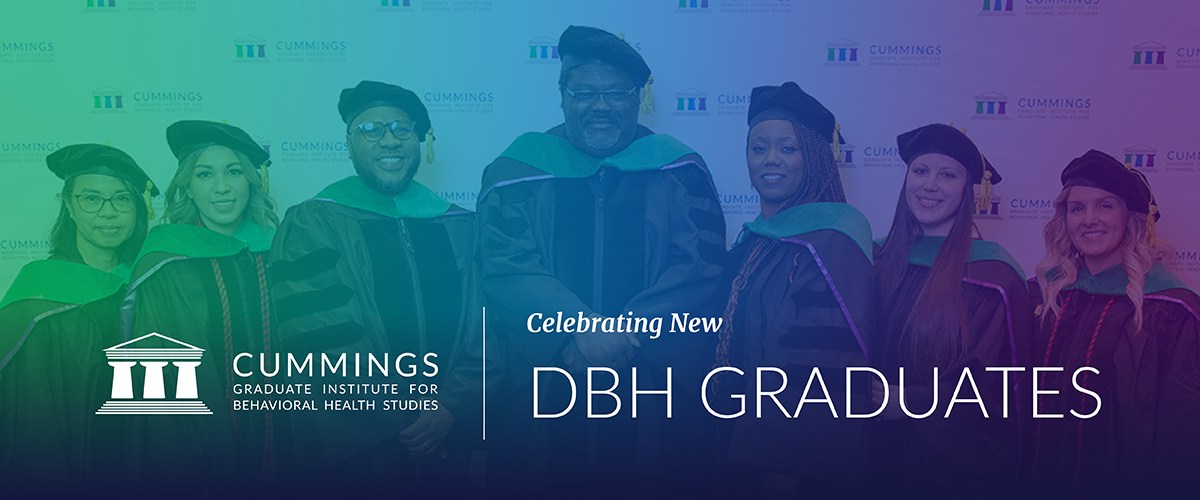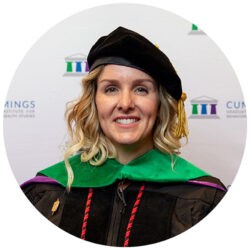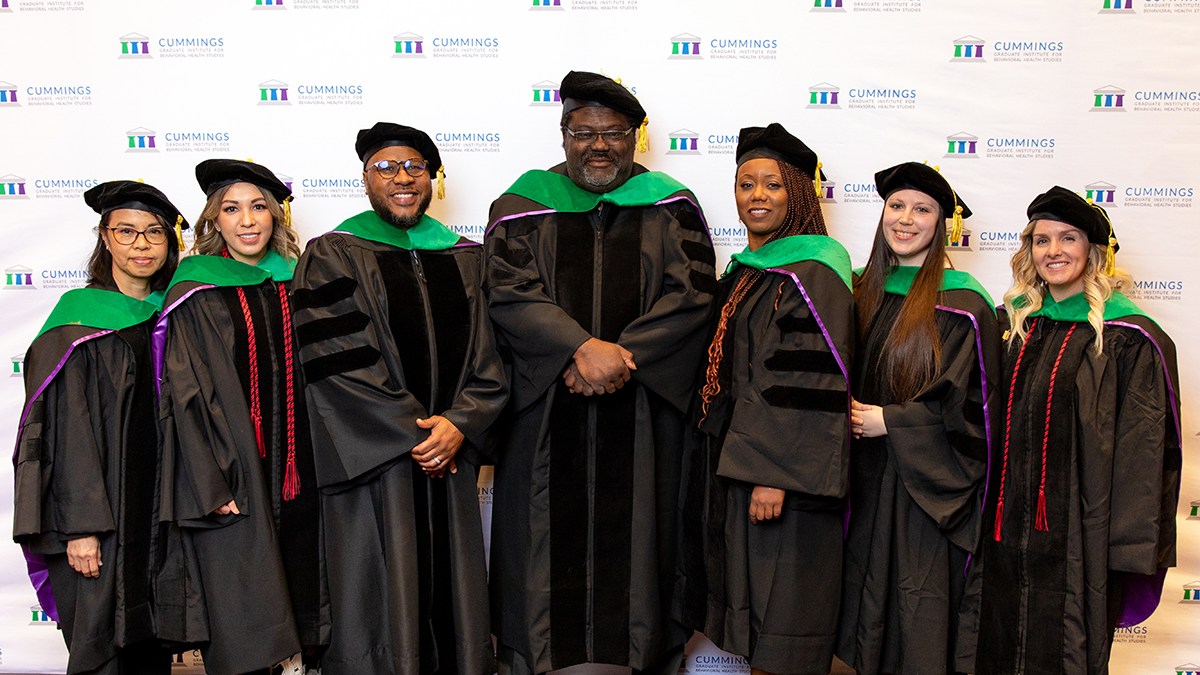 Cummings Graduate Institute for Behavioral Health Studies Celebrates New Doctor of Behavioral Health Graduates
Cummings Graduate Institute for Behavioral Health Studies Celebrates New Doctor of Behavioral Health Graduates
September 24, 2024
Cummings Graduate Institute for Behavioral Health Studies (CGI), a nonprofit institution specializing in integrated behavioral health education, is proud to announce the graduation of seven new Doctors of Behavioral Health.
- Dr. Erin Enwright, DBH, MS
- Dr. Napoleon Harrington, DBH, LPC, MA
- Dr. Bridgette Kinna, DBH, LCSW
- Dr. Vivian Marana-Manchess, DBH, BCBA, LBA, CASAC
- Dr. Pauline Pablo, DBH, BCBA, IBA
- Dr. Ronnie Tyson, DBH, MSW
- Dr. Rebecca Wright, DBH, LBA, BCBA
These graduates successfully completed the rigorous requirements of the Doctor of Behavioral Health (DBH) program and were honored at the DBH Commencement Ceremony on May 6, 2024, in Chandler, AZ. CGI celebrates their hard work, perseverance, and dedication in achieving this significant milestone and is honored to have supported them throughout their academic journey.
 Dr. Erin Enwright, DBH, MS
Dr. Erin Enwright, DBH, MS
Dr. Erin Enwright earned her B.A. in Psychology at Florida Atlantic University and her M.S. in Mental Health Counseling at Nova Southeastern University. She is a Licensed Mental Health Counselor with a passion for public service and helping her community. Working for county government in Miami Fl, she focuses on developing policies and programs to improve health outcomes for the community and its most vulnerable populations. Her work includes developing and implementing community-based programs in underserved areas of Miami-Dade County with a heavy focus on mitigating youth gun violence, and improving youth mental health and resiliency. Dr. Enwright is an appointed member of the Board of Adjustment for the city of Margate, Fl. She has held this position for 3 years and enjoys the opportunity to provide a valuable public service to her community. While enrolled in the DBH program, Dr. Enwright completed three certificate programs, the Integrated Behavioral Health Adult speciality certificate, the Integrated Behavioral Health Leadership speciality certificate, and the Integrated Behavioral Health Women’s Health speciality certificate. Dr. Enwright earned her Doctor of Behavioral Health (DBH) degree from Cummings Graduate Institute for Behavioral Health Studies in 2023.
Dr. Enwright’s culminating project, Executive Function Training to improve Academic and Health Outcomes in Children with ADHD, established a school-based entrepreneurship program focused on enhancing long-term treatment outcomes for children with ADHD. The program integrates executive function skills training, shown to improve academic success for all students, particularly those diagnosed with ADHD. By empowering individuals with strategies to better manage their symptoms, Dr. Enwright’s project addresses a vital gap in chronic condition management, ultimately improving both treatment outcomes and overall quality of life.
 Dr. Napoleon Harrington, DBH, LPC, MA
Dr. Napoleon Harrington, DBH, LPC, MA
Dr. Napoleon Harrington is the Founder and Therapist of the Ambassador Counseling & Resource Group, an award-winning collaborative counseling organization dedicated to providing people and professionals with proficient counseling and training services. Upon earning his bachelor’s degree, he was awarded the Human Relations Award, a significant honor given to one graduating senior at Oakland University. Dr. Harrington is an award-winning presenter with national and international experience, and his leadership has been recognized by civic organizations and government officials. In January of 2016, he was inducted into the fifth class of the “Elite 40 under 40 of Oakland County”. Dr. Harrington is an alumnus and class president of the 28th class of Leadership Oakland – a premiere leadership program. He has served as past President of the Michigan Mental Health Counselors Association. In that role, Dr. Harrington was instrumental in the passage of Public Act 96 of Michigan, legislation that rescued the licensed professional counselor from a detrimental and uncertain future. Dr. Harrington was awarded the “2020 Counselor of the Year”, by the American Mental Health Counselors Association. In 2021, he was appointed by Governor Gretchen Whitmer to the Michigan Board of Counseling. While enrolled in the DBH program, Dr. Harrington completed two certificate programs, the Integrated Behavioral Health Gerontology speciality certificate and the Integrated Behavioral Health Leadership speciality certificate. Dr. Harrington earned his Doctor of Behavioral Health (DBH) degree from Cummings Graduate Institute for Behavioral Health Studies in 2024.
Dr. Harrington’s culminating project, Care & Connect: An Evidence-Based Care Program for In Vitro Fertilization, addresses the emotional costs associated with IVF. While advancements in reproductive medicine offer hope to many, the IVF process often leads to increased levels of anxiety, depression, and shame. Through his culminating project, Dr. Harrington developed an integrated behavioral intervention support program specifically designed for individuals undergoing IVF treatment. By offering comprehensive psychological support and evidence-based interventions, the program seeks to address the psychological and psychosocial issues that are inherent in the IVF journey. Utilizing mindfulness practices, stress management techniques, and cognitive-behavioral therapy principles, the program equips participants with useful tools to manage the emotional impact of in vitro fertilization (IVF), build resilience, and foster a sense of empowerment throughout the treatment process.
Learn more about Dr. Harrington’s culminating project.
 Dr. Bridgette Kinna, DBH, LCSW
Dr. Bridgette Kinna, DBH, LCSW
Dr. Bridgette Kinna grew up on a farm in Maryland which instilled in her a love of nature, gardening, and good home-cooked meals. That upbringing also taught her the value of community and how interconnected we are with both the environment and each other. This motivated Dr. Kinna to pursue a career in public health. She earned a Master of Social Work degree with a clinical concentration from the University of Maryland School of Social Work. Her background is in forensic behavioral health providing direct care to the detained population. While enrolled in the DBH program, Dr. Kinna completed three certificate programs, the Integrated Behavioral Health Adult speciality certificate, the Integrated Behavioral Health Gerontology speciality certificate, and the Integrated Behavioral Health Leadership speciality certificate. Dr. Kinna earned her Doctor of Behavioral Health (DBH) degree from Cummings Graduate Institute for Behavioral Health Studies in 2024.
Dr. Kinna’s culminating project, Combating Correctional Fatigue: The Role of Resilience, details the implementation of a holistic virtual wellness platform designed to address the cumulative effects of occupational stress injuries among correctional personnel. By utilizing a resilience-focused model, the platform aims to mitigate stress injuries and enhance overall well-being.
Learn more about Dr. Kinna’s culminating project.
 Dr. Vivian Marana-Manchess, DBH, BCBA, LBA, CASAC
Dr. Vivian Marana-Manchess, DBH, BCBA, LBA, CASAC
Dr. Vivian Marana-Manchess is a Board-Certified Behavior Analyst (BCBA),Qualified Behavior Analyst (QBA) and an International Behavior Analyst (IBA). She is a Licensed Behavior Analyst and a Credentialed Alcohol and Substance Abuse Master Counselor (CASAC-MC) in New York State. Her career in the behavioral field extends from the psychiatric wards and family advocacy clinic at the Walter Reed Army Medical Center to the Office of People with Developmental Disabilities (OPWDD) agencies, private homes, and alternative school settings. Upon completing her military tour, she attained a Doctor of Medicine and Surgery from the Philippines and practiced in general medicine. Dr. Marana-Manchess taught the medical component of substance use as part of a CASAC training curriculum to those pursuing the credential, including employees of New York City’s Treatment Alternative to Street Crime (TASC). She is a certified Program for the Education and Enrichment of Relational Skills (PEERS) provider and a certified instructor on nonviolent crisis intervention and a Certified Perinatal Educator (CPE), providing doula and lactation support and childbirth education. While enrolled in the DBH program, Dr. Marana-Manchess completed three certificate programs, the Integrated Behavioral Health Gerontology speciality certificate, the Integrated Behavioral Health Leadership speciality certificate, and the Integrated Behavioral Health Women’s Health speciality certificate. Dr. Marana-Manchess earned her Doctor of Behavioral Health (DBH) degree from Cummings Graduate Institute for Behavioral Health Studies in 2024.
Dr. Marana-Manchess’s culminating project, Trauma-Informed Training for Doulas: An Integrated Healthcare Approach, addresses the heightened risk of maternal and infant morbidity and mortality in vulnerable and underserved populations, including pregnant incarcerated women. These populations have complex needs that require integrated healthcare solutions. This project, based on an integrated healthcare model, trains doulas to use a trauma-informed approach, expanding their role to support clients with medical, mental health, and social determinants of health. By equipping doulas to provide person-centered, trauma-informed care, the project enhances access to essential healthcare and support services, empowering clients and improving their quality of life. The goal of this project is to help achieve the Quadruple Aim of better health outcomes, improved patient experiences, lower healthcare costs, and provider well-being.
Learn more about Dr. Marana-Manchess’s culminating project.
 Dr. Pauline Pablo, DBH, BCBA, IBA
Dr. Pauline Pablo, DBH, BCBA, IBA
Dr. Pauline Tolentino Pablo is a trauma-aware Board Certified Behavior Analyst, mother, wife, and healthcare advocate. She holds a Bachelor of Arts degree in Psychology and a Master of Arts degree in Teaching with a specialization in Applied Behavior Analysis. Her work as a behavior analyst focuses on providing behavioral support services to neurodiverse individuals diagnosed with various developmental disabilities. Dr. Pablo co-owns and operates Symphony Behavioral Health Inc., a neurodiversity affirming ABA company serving the southern California region. She is also the co-founder of Asian, Pacific Islanders, and Behavior Analysis (APIABA), a non-profit organization that aims to disseminate the science of ABA within the Asian and Pacific Islander population, as well as promote diversity within the field to better serve diverse populations. While enrolled in the DBH program, Dr. Pablo completed three certificate programs, the Integrated Behavioral Health Gerontology speciality certificate, the Integrated Behavioral Health Leadership speciality certificate, and the Integrated Behavioral Health Women’s Health speciality certificate. Dr. Pablo earned her Doctor of Behavioral Health (DBH) degree from Cummings Graduate Institute for Behavioral Health Studies in 2023, a degree that has equipped her with the knowledge to serve her clients with a human-centered, trauma-informed, and integrated healthcare approach.
Dr. Pablo’s culminating project, Finding the Silver Lining: Integrating Behavioral Gerontology in Elderly Care Settings, introduces a new program by Symphony Behavioral Health Inc. aimed at enhancing healthcare outcomes and overall quality of life for elderly adults in geriatric care settings by integrating behavioral gerontology services into geriatric care settings. Elderly individuals in geriatric care settings often experience gaps in care that exacerbate symptoms of depression, anxiety, and cognitive decline, contributing to unsafe behaviors like combativeness, falling, and wandering. The integration of behavioral gerontology services seeks to comprehensively address the psychological, physiological, behavioral, and social needs of elderly patients by creating an environment that provides dignified support and autonomy. Dr. Pablo’s project also includes training and consultation for caregivers, nurses, medical personnel, and healthcare administrators to equip them with the skills to support elderly individuals under their care, prevent compassion fatigue, and improve professional quality of life (pQOL). The overall goal of this project is to serve as a silver lining that improves the healthcare outcomes of elderly patients and the wellbeing of geriatric care providers, despite the multitude of challenges each group experiences.
Learn more about Dr. Pablo’s culminating project.
 Dr. Ronnie Tyson, DBH, MSW
Dr. Ronnie Tyson, DBH, MSW
Dr. Ronnie Tyson is a husband and father of three adult children. He serves as the Deputy Director at Flint Odyssey House Inc, motivating others to seek a productive lifestyle, through self-knowledge. His culminating project is designed to motivate his children and grandchildren to seek their own path. While enrolled in the DBH program, Dr. Tyson completed two certificate programs, the Integrated Behavioral Health Gerontology speciality certificate and the Integrated Behavioral Health Leadership speciality certificate. Dr. Tyson earned his Doctor of Behavioral Health (DBH) degree from Cummings Graduate Institute for Behavioral Health Studies in 2024.
Dr. Tyson’s culminating project, Health Equity Grounded Leadership: A Path to Integrated Care for Substance Use Disorders, aims to investigate whether leadership training, rooted in health equity principals, for substance use disorder (SUD) providers, will enhance their knowledge, skills, and confidence in implementing fiscal sustainability measures for integrated care, population health, and health equity initiatives.
Learn more about Dr. Tyson’s culminating project.
 Dr. Rebecca Wright, DBH, LBA, BCBA
Dr. Rebecca Wright, DBH, LBA, BCBA
Dr. Rebecca K. Wright is Certified Behavior Analyst and a Licensed Behavior Analyst in the state of New York. She received both her undergraduate degree in Psychology and her Masters of Science in Education at Long Island University. Dr.Wright has worked as a certified school psychologist for Early Intervention agencies and has also worked as a Behavior Specialist for the Office of People With Developmental Disabilities in New York. She has 20 years of clinical experience working with individuals with special needs. While enrolled in the DBH program, Dr. Wright completed two certificate programs, the Integrated Behavioral Health Leadership speciality certificate and the Integrated Behavioral Health Women’s Health speciality certificate. Dr. Wright earned her Doctor of Behavioral Health (DBH) degree from Cummings Graduate Institute for Behavioral Health Studies in 2024. Since graduating, Dr. Wright’s culminating project assessment has been approved for copyright from the United States copyright office.
Dr. Rebecca Wright’s culminating project, Can an integrated healthcare assessment explicitly developed for Early Intervention (EI) services benefit the overall development of children identified as an part of a marginalized community?, is an integrated healthcare assessment designed for children from marginalized communities who qualify for EI services. Early Intervention (EI) provides evaluations and services for children at risk of or diagnosed with developmental delays/disorders. Unfortunately, the high-risk population, which includes children below 200% of the federal poverty level, second-generation immigrants, and minority groups, is not consistently being referred for EI services. Children in poor communities lacking access to resources will have poor health outcomes later in life. The goal of Dr. Wright’s project is to improve the quality of care for children from marginalized communities by addressing social determinants of health that impact childhood development.
Learn more about Dr. Wright’s culminating project.
 When reflecting upon the new graduates’ accomplishments, Dr. U. Grant Baldwin, Jr., DBH, Director of the DBH program, shares,
When reflecting upon the new graduates’ accomplishments, Dr. U. Grant Baldwin, Jr., DBH, Director of the DBH program, shares,
“I want to personally say how proud I am of these scholars for successfully completing their doctoral journey. Each graduate has demonstrated the ability to find their own unique voice as they matriculated through the DBH program with the support of our amazing administrative and academic team and their family and friends. This group of graduates embody the “true spirit” of being a disruptor in health care and will challenge the inequalities seen to ensure that all people have access to the quality healthcare they deserve.”
Each of these graduates brings a unique perspective to healthcare as a Doctor of Behavioral Health, and CGI eagerly anticipates the impact they will make in improving healthcare delivery and patient care.
 About Cummings Graduate Institute for Behavioral Health Studies (CGI)
About Cummings Graduate Institute for Behavioral Health Studies (CGI)
Cummings Graduate Institute for Behavioral Health Studies is a nonprofit, DEAC-accredited, online post-graduate institution of higher learning offering post-graduate education and training in the field of integrated behavioral healthcare. CGI is focused on meeting the healthcare industry’s need for a highly-skilled workforce to support an integrated approach to addressing patients’ needs. To learn more about CGI, visit, https://cgi.edu/.
For further information or to arrange interviews, contact:
Cummings Graduate Institute for Behavioral Health Studies
Melissa McGurgan
melissa@cgi.edu






























